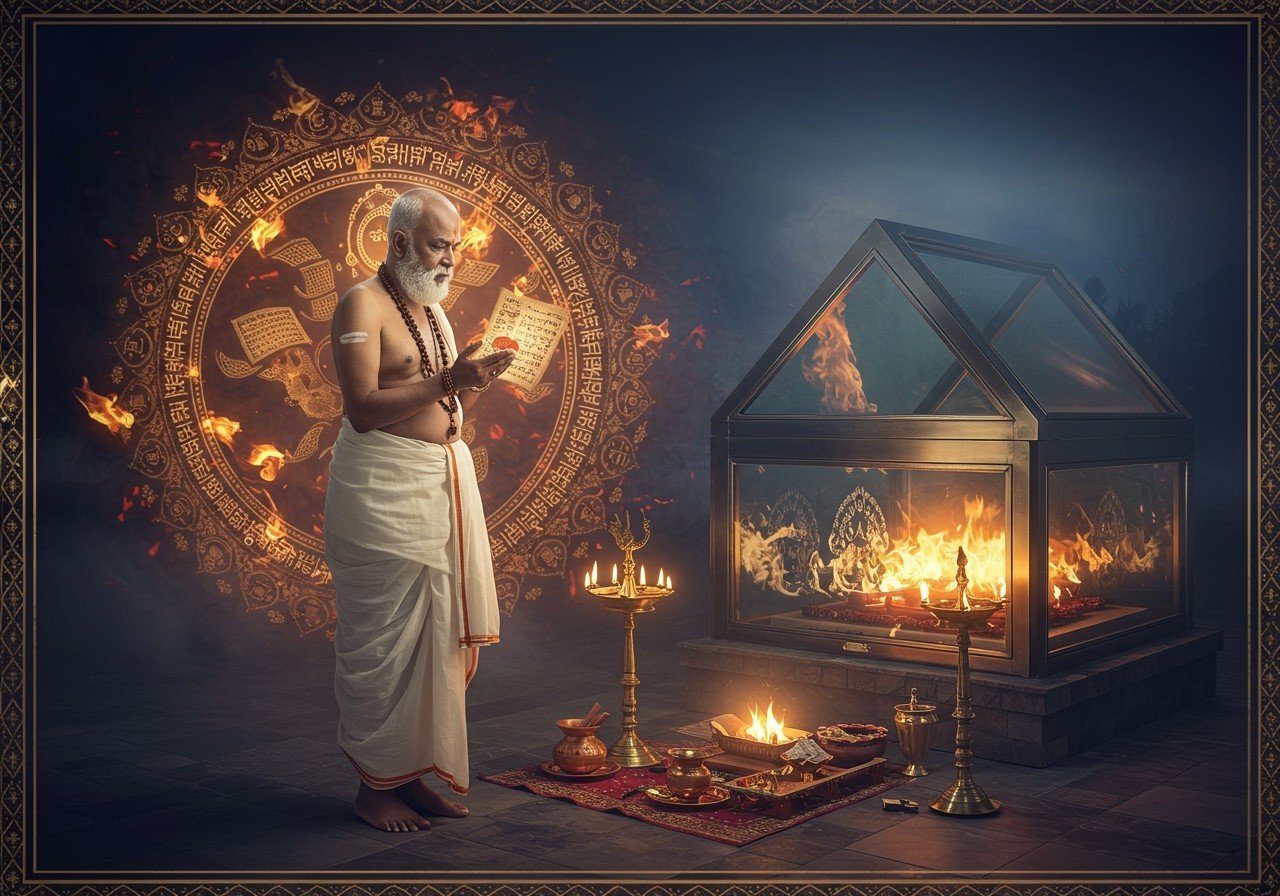
In Hinduism, cremation rituals are deeply meaningful, signifying not an end, but a sacred transition in the soul’s eternal journey. These ceremonies, steeped in tradition and reverence, are performed with utmost care and respect, guiding the atman (soul) towards its next life. A knowledgeable Pandit, or priest, plays a vital role in these sacred rites, offering spiritual guidance and ensuring the ceremonies are conducted according to dharma (righteous conduct).
The Pandit’s Role: A Spiritual Guide
The Pandit’s presence is a source of comfort and strength during a difficult time. They are not just officiants, but spiritual guides, leading the family through each step of the cremation ceremony with wisdom and compassion. From reciting mantras and shlokas (verses) that ease the soul’s passage to performing the necessary rites, the Pandit ensures that every aspect aligns with Hindu scriptures. Choosing an experienced and knowledgeable Pandit is paramount for these sacred ceremonies. For those seeking guidance, you can explore resources on Hinduism here.
Understanding the Cremation Ceremony
The Hindu cremation ceremony, known as Antyeshti, is a meticulously orchestrated sequence of rituals, each carrying profound significance:
Initial Steps After Death:
- Preparation: Upon passing, the body is treated with reverence. Family members gather, offering prayers and lighting incense to create a peaceful and purified atmosphere. This time is for quiet reflection and remembrance, honoring the life lived.
- Practical Matters: A physician or coroner certifies the death and issues a death certificate. Family and close friends are informed with sensitivity and respect. Funeral arrangements begin, often with the assistance of a funeral home or community members.
Preparing the Body:
- Ritual Cleansing: The body is gently washed with a mixture of yogurt, milk, ghee, and honey, symbolizing purification. This act of service is often performed by family members, expressing their love and devotion.
- Anointing and Adornment: Fragrant sandalwood paste or turmeric is applied to the forehead. The body is dressed in simple, clean white garments, or a shroud. Garlands of flowers, symbols of respect and affection, are placed upon the body.
Find authentic puja items and clothing at Poojn.in.
Funeral Rites:
- Timing and Location: The Antyeshti typically occurs within a day or two after death, allowing time for family to gather. Traditionally, the final rites begin at home.
- Sacred Chants and Prayers: The Pandit leads the chanting of mantras and prayers, creating a spiritually charged atmosphere. The eldest son or a close male relative often takes a leading role in these rituals.
- Procession to Cremation Ground: The body is carried on a bier to the cremation ground, accompanied by mourners reciting prayers. Traditionally, male relatives carry the bier, a final act of service.
- The Cremation: The body is placed on the pyre, feet facing south. The eldest son or a designated relative lights the pyre, symbolizing the release of the soul. Offerings, such as rice balls, are made to nourish the soul on its journey. You can find essential items for these rituals at Poojn.in.
After the Cremation: Continuing the Journey
The journey doesn’t end with the cremation. Important rituals follow, aiding the soul’s onward passage and providing solace to the bereaved:
Ashes and Purification:
- Collecting the Ashes: A day or two after cremation, the ashes are collected and respectfully immersed in a sacred river, preferably the Ganges, or a place of significance to the deceased. This signifies the soul’s liberation from the physical body.
- Cleansing and Renewal: Upon returning from the cremation ground, family members bathe and cleanse their homes, signifying a fresh start.
Mourning Period and Rituals:
- The Thirteen Days: A period of mourning typically lasts for thirteen days. Family members often wear white, a symbol of purity and transition. They receive visitors, sharing memories of the departed soul. Prayers and rituals are performed daily to guide the soul.
- Terahvin Ceremony: On the thirteenth day, the Terahvin ceremony marks the culmination of the mourning period. Pind Daan, the offering of rice balls, is performed to nourish the soul on its onward journey. Prayers and chants led by the Pandit offer solace and blessings.
- Memorial Service: A memorial service, often held on the anniversary of the passing, further honors the departed soul’s memory. Poojn.in offers a variety of items suitable for memorial services.
Modern Adaptations: Honoring Tradition in a Changing World
In today’s world, technology is helping families maintain these sacred traditions while navigating busy lives. Online platforms connect families with Pandits, offering virtual consultations and resources. This blend of tradition and technology respects cultural values while providing convenience.
Poojn.in: Supporting Your Spiritual Needs
Poojn.in understands the importance of these sacred rituals and offers a comprehensive selection of products and services to support families during these times. From complete cremation kits, containing all the necessary items verified by experienced Pandits, to individual items such as Kapoor (camphor), pure ghee, and cotton threads, Poojn.in ensures you have access to authentic and high-quality materials. Explore our range of hawan samagri.
For personalized assistance with Pandit services, our dedicated team is available at 03369029784 or via WhatsApp at 9476142738. We are committed to supporting families through every step, providing guidance and ensuring all materials are delivered respectfully and promptly. You can also find a variety of decorative items for your puja room here.
FAQs: Common Questions about Cremation Rituals and the Pandit’s Role
What makes a Pandit essential for Hindu cremation ceremonies? The Pandit’s knowledge ensures the proper execution of the rituals, which are believed to be crucial for the soul’s journey and the family’s peace of mind.
Can I find a Pandit for rituals like Pind Daan online? Yes, online platforms now facilitate connections with qualified Pandits, offering convenience and accessibility.
What’s involved in preparing for a cremation ceremony with a Pandit? Preparation includes gathering specific items like wood, ghee, and flowers, as guided by the Pandit, according to tradition and family customs.
For a deeper understanding of Hindu Gods and Goddesses, explore our guide here. Learn more about the significance of Hindu Temples here.
How can a Pandit help the grieving family emotionally? The Pandit’s presence offers comfort, guidance, and spiritual support, helping the family cope with loss and find solace in tradition.
How can I learn more about coping with grief according to Hindu rituals? You can find a helpful guide here.


